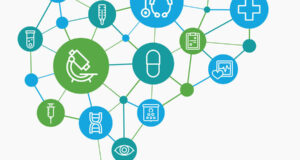
AI: Promise, Peril and Precision
BY , PhD, MPH
There is an immense buzz surrounding AI. Amid that buzz is a unique mix of controversy, fear, promise and challenges. So much of the time we perceive AI to be, or characterize it to be, something exaggerated, like what we see in movies. We fear the genie has gotten out of the bottle. That being said, AI has the potential of creating a very different world quickly and in some pretty profound ways. However, in our enthusiasm for the upside, we cannot ignore the potential downside. As such, we need to be vigilant in identifying the safeguards, caveats and thresholds critical for reducing worry, misinformation, bias and abuse. Most of this is self-regulated today, but that is likely to change as the broad-scale impact of AI increases. Guardrails to ensure a promising and hopeful future as we accelerate the rate of transformative change are needed. Moreover, the lock makers and the lock pickers need to be identified and defined.
AI systems have the potential to be so good so quickly that they may compete with or surpass the best knowledge and expertise. How we leverage that into actionable solutions is quite exciting. AI can spawn super intelligence that can be readily available to benefit all of us and reinvent the world in which we live. We know that there is a host of ethical issues dealing with privacy and data ownership, but there are other, more subtle ethical issues that are not being voiced, such as the fact that in our enthusiasm to adopt AI, there is a lack of realization that this human tool is not flawless and the thirst for greater precision does not equate with flawlessness. We can’t expect for something human-made to become beyond or meta-human, as my friend and colleague, Dr. Hassan Tetteh, former CMIO of the Navy and CEO of Human Care Technologies, warns. Moreover, we don’t want to ignore, undermine, or thwart the creative and artistic side of caring with inflexible cookie-cutter solutions that do not serve either individuals or the masses well.
The potential explosion of digital power beyond our imagination is highlighted by Eric Schmidt, former CEO, and chairman of Google, when he spoke at the Abundance 360 conference on how the scale of AI innovation and synthesizing complex data is profound, allowing us to solve what were perceived to be unsolvable problems. In essence, it allows us to invent the future. That future needs to be shaped in a way that makes a profound positive difference in our lives.
AI offers the promise of helping us make more informed, precise and optimized decisions. Amassing and aggregating large amounts of information and knowledge will help us benefit from the wealth of wisdom, literature and science of the past. Moreover, we have the unprecedented capacity to enhance and augment decision-making and reduce bias, to be more precise and be truly transformative.
A wide range of actionable medical AI solutions can help us to meet the challenges of access, availability of services, procedures, interventions and improved workflows. It can also help us meet unmet needs in rural, medically underserved and hard-to-reach areas, ensuring greater access and availability 24/7 in a highly scalable way. When you blend AI with precision medicine, the value equation skyrockets. Whether we are talking about upping the knowledge ante or about generative AI autonomous robots, we are facing truly remarkable transformation. The promise, as well as the perils, it portends for the future is mind boggling.
In late March, I attended an AI exponential thinking day at the Abundance 360 conference in southern California. Among the luminaries and transformative thinkers there were the former chairman and CEO of Google, the AI cloud guru from Google, Carolyn Yap, Elon Musk and XPrize Luminaries Peter Diamantis and Anousheh Ansari. I also spent a good deal of time with Beyond imagination, whose autonomous robot is being designed to among other things serve as a surgical tech. Pretty fascinating stuff. The breadth of opportunities is almost unimaginable. On the health and healthcare side, some pretty stellar opportunities were highlighted.
Some of the promising potential of AI is allowing us to detect breast cancer earlier with vision AI to validate or confront. There is a wide variety of diagnoses and retinal disease detection as well as a wide variety of precision in radiology, including identifying abnormalities on mammograms, improved assessment of breast tissue density in screening studies and helping us weed out and ruling out negatives. It also can support and augment detection with machine learning as well as identify patterns that would otherwise be missed by detecting peripheral or ancillary findings and bring attention to findings that might otherwise be unnoticed—the future is now!
 Dennis A. Robbins, PhD, MPH, has been a luminary in healthcare for decades. His work has been showcased in AHA’s Hospital Ethics & Managed Healthcare Executive where he was honored as among the top keenest thinkers in managed care alongside such luminaries as the founder of AHIP & creator of the ACA (Obamacare).
Dennis A. Robbins, PhD, MPH, has been a luminary in healthcare for decades. His work has been showcased in AHA’s Hospital Ethics & Managed Healthcare Executive where he was honored as among the top keenest thinkers in managed care alongside such luminaries as the founder of AHIP & creator of the ACA (Obamacare).
Dennis seamlessly integrates cross disciplinary perspectives from HIT, healthcare, technology, devices, engagement, ethics, gamification, Ai, behavioral economics, digital health, addiction medicine, exercise physiology, policy, payment sleep, activity, and genomics to bend the sickness curve. He has been an advisor to several leading edge companies in the AI and Natural language processing space He worked with the Division of Geriatrics at Harvard Medical, ran an Institute on Aging, was a Board Advisor to Silver Sneakers and worked closely with Ted Kennedy, Bob Dole and CMS to help create the Hospice Medicare benefit. He headed a national military health innovation think tank for several years. His >40 years as a speaker and author is augmented by leading edge thinking on why people do what they do.
He contributes to the literature extensively, publishing 12 books in healthcare, hundreds of articles, delivered >1000 lectures, keynotes, & panels. Dennis was a major influence in developing the Time Life Books program. His innovations have been recognized in the national media in such publications as Forbes, Medical Economics, Modern Healthcare, Hospital Ethics, and Managed Healthcare Executive.




